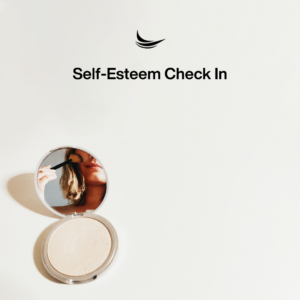Self-Esteem Check In
 Self-esteem is a topic that comes up a lot in therapy, especially around dates that may trigger social comparison and loneliness. Did you know that there is a term for feelings such as sadness, loneliness, and anxiety that some people experience in association with Valentine’s Day called the “Valentine’s Day Blues”?
Self-esteem is a topic that comes up a lot in therapy, especially around dates that may trigger social comparison and loneliness. Did you know that there is a term for feelings such as sadness, loneliness, and anxiety that some people experience in association with Valentine’s Day called the “Valentine’s Day Blues”?
Self-esteem is defined as one’s overall sense of value or worth and includes important aspects including:
- Self-confidence
- Feelings of security
- Identity
- Sense of belonging
- Feelings of importance
Many factors impact self-esteem such as early childhood experiences, the impact of stressful and traumatic life experiences, biopsychosocial factors, and experiences of racism and discrimination.
When was the last time you checked in with yourself to see how you were coping?
How Do You Rate Your Self-Esteem?
Taking a “Self-Guided Tour” from the National Association for Self-Esteem can be a helpful starting point to explore your self-esteem and better understand your thinking patterns and emotional reactions, especially during times in which there may be heightened social comparison. Your responses can help provide insight into topics that you may want to further explore with a therapist.
Some of the questions to consider include:
- How do you respond when you make a mistake?
- When you look at yourself in the mirror, what do you see?
- What is your response when dealing with problems?
- How do you respond when your wants and needs differ from others?
- What comes to mind when you think about the greater purpose of your life?
- What is your response when you make a commitment to yourself?
- What does your inner voice (self-talk) sound like?
- How do you react when others give you feedback?
Further exploring thoughts, feelings, and behaviors in response to the above scenarios can help provide insight into patterns and help with learning new responses in difficult areas.
For example, making mistakes does not feel good, and dealing with problems can be stressful! Responses such as shame, embarrassment, and anxiety are normal. Behaviors can range from denial, avoidance, and/ or blaming others to acceptance on one end of the continuum to over-apologizing, self-blame, and taking responsibility for not only one’s role but also assuming responsibility for others’ problems. Your therapist can help you move towards finding a healthy balance.
One’s inner dialogue can default to being overly critical, putting a high standard on the self which impacts self-esteem. It can be difficult to love yourself when your confidence is low, especially when comparison sets in. So often we look for others’ acceptance, approval, and validation to feel worthy and loveable. When loneliness is heightened, negative self-talk can quickly spiral and lead to unhealthy ways of coping.
If you find yourself struggling, check in with yourself. Ask what you need, consider talking to a therapist, and check out tips to build self-esteem.
Perhaps it is time to let go of shame, worry, insecurity, and toxicity and focus on self-acceptance.
Maybe learning to trust yourself, and increasing feelings of safety, security, and belonging may be where you are at.
It is so empowering to connect with others who love and accept you for who you are, while also accepting and embracing your own value and worth.
Written By: Charlotte Johnson, MA, LPCC



























